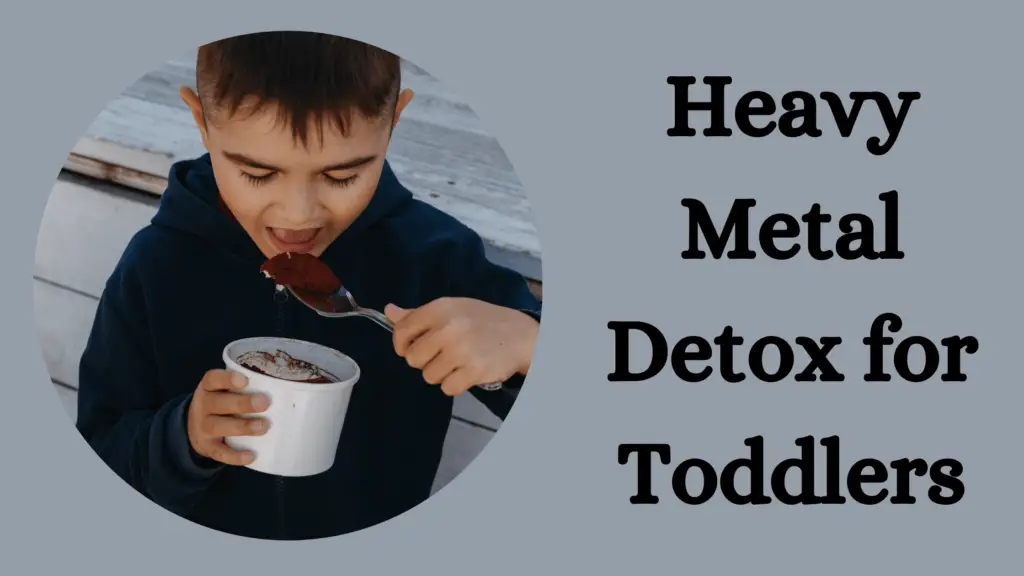As parents, our children’s health is our top priority. We strive to create safe and nurturing environments for them to thrive. However, sometimes unseen dangers, like heavy metal exposure, can pose risks to our toddlers. In knowing how to detox heavy metals toddler, the two key things you have to keep in mind is that you have to feed your child a healthy diet and make sure your child is getting enough fluids.
Common Sources of Heavy Metal Exposure
Heavy metal exposure can occur through various sources, some of which might surprise you. It’s essential to be aware of these potential sources, including:
Lead-based Paint
Lead-based paint, often found in older homes, can deteriorate over time, leading to lead dust and chips that toddlers can ingest. Even homes that have been painted over may still pose a risk if the underlying lead-based paint is disturbed.
Contaminated Water
Some water sources may contain heavy metals like lead, arsenic, or cadmium, which can harm your child’s health if consumed. Older plumbing systems and lead pipes can be a source of lead contamination in tap water.
Food Contamination
Certain foods, especially fish (such as tuna and swordfish) and rice, may contain higher levels of heavy metals due to environmental factors. These metals accumulate in the tissues of fish and can be absorbed by rice from contaminated soil or water.
Environmental Factors
Toddlers may come into contact with heavy metals in the environment, such as contaminated soil or dust, which they might accidentally ingest while playing in outdoor areas or touching surfaces with dust containing heavy metal particles.
The Potential Health Risks
Heavy metal exposure in toddlers can have serious health and mental consequences. These risks include:
Neurological Damage
Lead exposure, in particular, can lead to irreversible damage to a child’s developing brain, causing developmental delays and learning disabilities. Even low levels of lead exposure can impact a child’s cognitive function.
Behavioral and Cognitive Issues
Heavy metals can affect a child’s behavior and cognitive function, potentially leading to issues like Attention-Deficit/Hyperactivity Disorder (ADHD) or reduced IQ. These effects may have long-lasting implications for a child’s educational and social development.
Gastrointestinal Distress
Ingesting heavy metals may cause stomachaches, vomiting, and diarrhea in toddlers. These symptoms can be distressing and may lead to dehydration or nutritional deficiencies if left untreated.
Long-Term Health Effects
Heavy metal exposure in childhood can have long-term health effects that extend into adulthood. For instance, it has been linked to an increased risk of heart disease, kidney problems, and even certain cancers later in life.
Signs of Heavy Metal Exposure
Recognizing the signs of heavy metal exposure is crucial for early intervention. While symptoms may vary depending on the type and level of metal involved, common signs include:
Developmental Delays
Children exposed to heavy metals may experience delays in speech and motor skill development. They may struggle to reach developmental milestones at the expected ages.
Irritability and Mood Changes
Toddlers exposed to heavy metals may exhibit increased irritability, mood swings, and behavioral changes. These shifts in temperament can be challenging for both the child and parents.
Fatigue and Weakness
Unexplained tiredness or weakness could be a sign of heavy metal toxicity. Children may lack the energy they once had and may seem lethargic.
Gastrointestinal Symptoms
Stomachaches, vomiting, and diarrhea may result from heavy metal ingestion. These gastrointestinal symptoms can be especially concerning in young children who may not be able to communicate their discomfort effectively.
If you notice any of these signs in your toddler, it’s crucial to seek medical attention promptly. Early detection and intervention can significantly impact the outcome of heavy metal exposure.

How to Detox Heavy Metals Toddler
Before digging deep into the subjected, here is a brief list of the ways on how to detox heavy metals toddler:
- Consult a Pediatrician: Before attempting any detoxification process, consult a pediatrician or a healthcare provider who specializes in children’s health. They can assess your toddler’s specific situation, conduct any necessary tests, and provide tailored recommendations.
- Identify the Source: Determine the source of heavy metal exposure, as this will help in prevention. Common sources include contaminated water, lead-based paint, certain foods, and environmental factors. Addressing the source is key to long-term prevention.
- Nutrition: Ensure your toddler receives a well-balanced diet rich in essential nutrients. Adequate nutrition can support the body’s natural detoxification processes. Include foods high in antioxidants and fiber, such as fruits, vegetables, whole grains, and lean proteins.
- Hydration: Encourage your toddler to drink clean, filtered water to help flush toxins from the body. Ensure that your water source is free from heavy metal contaminants.
- Avoid Risky Foods: Be cautious about certain foods that may contain higher levels of heavy metals, such as certain types of fish (e.g., tuna, swordfish), rice, and some baby foods. Consult with a pediatrician or nutritionist for guidance on safe food choices.
- Chelation Therapy: In severe cases of heavy metal poisoning, a healthcare provider may recommend chelation therapy. This medical treatment involves the use of chelating agents to bind to heavy metals and facilitate their removal from the body. Chelation therapy should only be administered under the supervision of a qualified healthcare professional.
- Reduce Environmental Exposure: Take steps to reduce your toddler’s exposure to heavy metals in the environment. This may include ensuring the removal of lead-based paint in your home, using safe drinking water sources, and avoiding contaminated soil or dust.
- Supplements: Do not give your toddler any supplements or alternative treatments for heavy metal detoxification without consulting a healthcare professional. Some supplements or remedies may not be safe for young children and could potentially do more harm than good.
- Regular Check-ups: Schedule regular check-ups with your pediatrician to monitor your toddler’s health and development. They can assess any potential signs of heavy metal exposure and provide guidance on managing any health concerns.
Consultation with a Pediatrician
If you suspect heavy metal exposure or notice any concerning symptoms in your toddler, the first step is to schedule a visit to a pediatrician. A healthcare professional can assess your child’s specific situation, conduct the necessary tests, and provide expert guidance on the next steps.
Role of a Healthcare Professional
Pediatricians play a vital role in evaluating your toddler’s health and potential heavy metal exposure. They can:
Conduct Tests
Perform blood tests or other diagnostic procedures to determine the presence and levels of heavy metals in your child’s body. Blood tests are especially useful for detecting lead exposure.
Offer Guidance
Provide recommendations tailored to your toddler’s needs, including potential detoxification methods or treatments. Healthcare professionals can create a personalized plan based on your child’s age, the type of heavy metal exposure, and the severity of symptoms.
Identifying and Eliminating the Source
Identifying and eliminating the source of heavy metal exposure is crucial for your toddler’s safety. Here’s how you can do it:
Home Inspection
If you live in an older home, consider having it inspected for lead-based paint. Even if the paint is not visibly peeling, it can pose a risk. Professionals can assess and safely remediate lead-based paint hazards.
Water Testing
Test your home’s water supply for heavy metal contamination. If necessary, install a water filtration system to ensure safe drinking water. Be sure to check for lead in pipes, fixtures, or plumbing components that could contaminate the water.
Safe Food Choices
Be cautious about the foods you introduce to your toddler’s diet. Some foods, like certain types of fish and rice, may contain higher levels of heavy metals. Opt for safer alternatives, and consider the following:
- Fish Selection: Choose fish that are low in mercury, such as salmon and tilapia. Limit or avoid high-mercury fish like shark and swordfish.
- Rice Alternatives: Consider alternatives to rice, such as quinoa or oats, which are lower in arsenic. If you do serve rice, select varieties that are less likely to absorb arsenic.
- Organic and Local Produce: Opt for organic fruits and vegetables when possible. Local produce may have lower exposure to environmental contaminants.
Environmental Assessment
Evaluate your toddler’s environment for potential sources of heavy metals, such as contaminated soil or dust. Take measures to reduce exposure in these areas:
- Safe Play Areas: Create designated play areas with clean soil or sand where your toddler can safely explore.
- Regular Cleaning: Establish a cleaning routine to reduce dust accumulation. Use high-efficiency particulate air (HEPA) filters in vacuums to capture fine particles.
- Shoe Removal: Encourage family members and visitors to remove their shoes before entering the home to prevent tracking in contaminants.
By taking these proactive steps, you can significantly reduce your toddler’s risk of further exposure to heavy metals.
Nutrition for Detoxification
A balanced diet plays a significant role in supporting your toddler’s natural detoxification processes. Proper nutrition provides essential nutrients and antioxidants that help the body eliminate toxins. Ensure your child receives proper nutrition by including the following in their diet:
Fruits and Vegetables
Provide a variety of fruits and vegetables that are rich in antioxidants and essential nutrients. Berries, spinach, broccoli, and carrots are excellent choices. These foods help combat oxidative stress and support the body’s detoxification pathways.
Whole Grains
Opt for whole grains like brown rice, whole wheat bread, and oats. These grains provide essential fiber and nutrients that aid in digestion and toxin removal.
Lean Proteins
Include lean sources of protein in your toddler’s diet, such as poultry, fish (choosing low-mercury options), and legumes. Protein supports the body’s natural detoxification processes and helps repair tissues.
Hydration and Clean Water
Proper hydration is essential for detoxification. Encourage your toddler to drink clean, filtered water to help flush toxins from the body. Consider investing in a water filter to ensure the purity of your tap water.
Read About: How to Convert Delta Crib to Toddler Bed
Safe Food Choices: Foods to Avoid
Be aware of foods that may contain higher levels of heavy metals and should be avoided or limited, including:
- High-Mercury Fish: Certain fish, such as shark, swordfish, king mackerel, and tilefish, are known for their high mercury content. Limit your toddler’s consumption of these fish, or avoid them altogether.
- Rice and Rice Products: Rice, especially brown rice, can contain elevated levels of arsenic. Rice products like rice cereal are common staples in toddler diets but should be used sparingly.
- Imported Spices: Some imported spices have been found to contain lead. Be cautious when using spices in your toddler’s meals and opt for reputable brands.
Healthy Alternatives
Replace risky foods with safer alternatives to ensure your toddler’s diet supports detoxification without exposure to heavy metals:
- Low-Mercury Fish: Choose fish like salmon, tilapia, and cod, which are lower in mercury. These options provide essential nutrients without the same level of heavy metal risk.
- Alternative Grains: Instead of rice, consider grains like quinoa, oats, and barley, which tend to have lower levels of arsenic. These grains can be used in a variety of toddler-friendly recipes.
- Local and Organic Options: When feasible, select locally sourced and organic fruits, vegetables, and grains. These options may have reduced exposure to heavy metal contaminants.
By making informed food choices, you can help support your toddler’s overall health and minimize the risk of heavy metal exposure through their diet.

Chelation Therapy: When Is It Necessary?
In severe cases of heavy metal poisoning, healthcare providers may recommend chelation therapy. This medical treatment involves the use of chelating agents to bind to heavy metals in the body, facilitating their removal. Chelation therapy is typically reserved for specific situations and should only be administered under the supervision of a qualified healthcare professional.
Instances Where Medical Intervention Is Required
Chelation therapy is not a routine treatment, and its use is determined by healthcare professionals based on the individual case. Instances where it may be necessary include:
High Blood Metal Levels
If blood tests reveal elevated levels of heavy metals, especially lead, chelation therapy may be considered. High blood metal levels indicate a significant exposure that may require more aggressive treatment.
Severe Symptoms
In cases where a toddler exhibits severe symptoms or complications due to heavy metal exposure, healthcare providers may opt for chelation therapy as part of a broader treatment plan. Severe symptoms may include neurological impairment, severe gastrointestinal distress, or acute poisoning.
It’s essential to follow your healthcare provider’s guidance if they recommend chelation therapy for your child. They will carefully assess the risks and benefits of this treatment and monitor your toddler’s progress throughout the process.
Read About: Why Does a Toddler Spin in Circles
Regular Pediatric Check-ups
Even after addressing heavy metal exposure, it’s crucial to maintain regular check-ups with your pediatrician. These appointments serve several purposes:
Monitoring Health and Development
Pediatricians can monitor your toddler’s health and development over time, ensuring that any potential long-term effects of heavy metal exposure are addressed promptly. They will track developmental milestones, conduct periodic blood tests, and assess your child’s overall well-being.
Preventive Care
Regular check-ups allow for preventive care and early intervention, reducing the risk of future exposure and health complications. Pediatricians can provide guidance on maintaining a safe environment and offer recommendations to support your toddler’s continued growth and development.
Conclusion
Safeguarding your toddler from heavy metal exposure and ensuring their well-being requires a cautious and informed approach. By understanding potential sources, recognizing signs of exposure, consulting a pediatrician, and taking proactive measures to eliminate the source and support detoxification, you can provide your child with the best possible protection.







